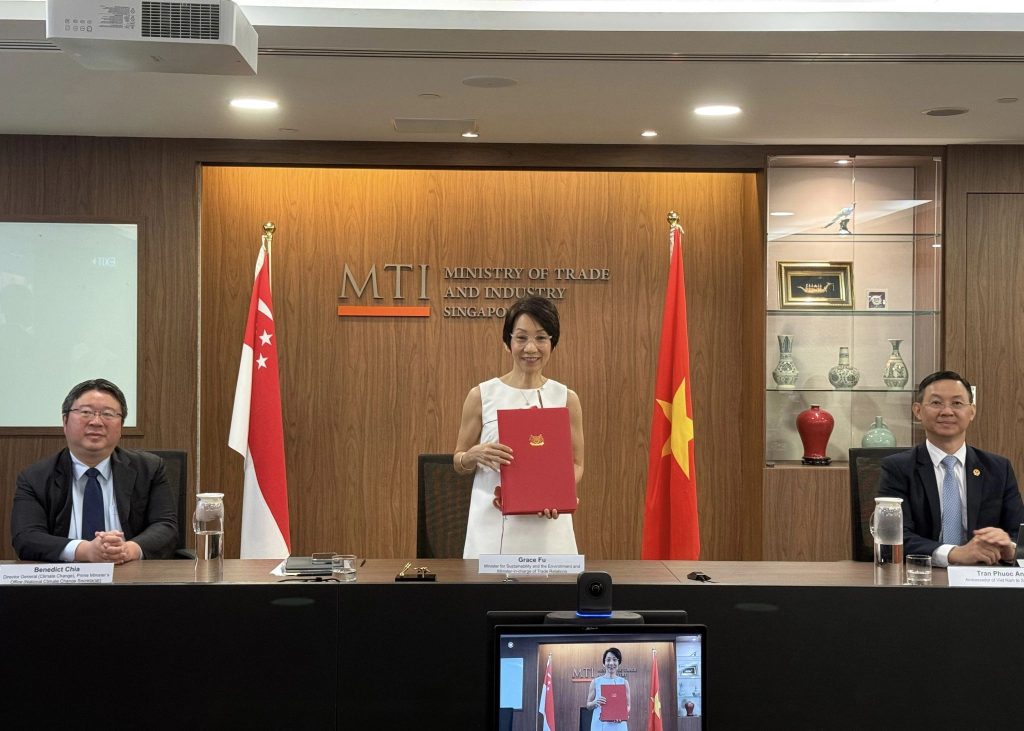16 September 2025 — Singapore and Vietnam have signed a landmark Implementation Agreement (IA) on carbon credits collaboration under Article 6 of the Paris Agreement.
The pact was signed virtually by Singapore’s Minister for Sustainability and the Environment Grace Fu and Vietnam’s Acting Minister of Agriculture and Environment Tran Duc Thang.
This agreement makes Vietnam the second Southeast Asian country, after Thailand, to formalise an Article 6 deal with Singapore. It is also Singapore’s ninth IA globally, following earlier agreements with Papua New Guinea, Ghana, Bhutan, Chile, Peru, Rwanda, Paraguay and Thailand.
What the Singapore–Vietnam IA Covers

Source: LinkedIn (Grace Fu)
The agreement establishes a legally binding bilateral framework for the generation, transfer and use of Internationally Transferred Mitigation Outcomes (ITMOs) — government-authorised carbon credits aligned with Article 6.
Key elements include:
- Corresponding adjustments to both countries’ greenhouse gas inventories to prevent double counting and ensure transparency.
- Eligible uses: Starting 1 January 2024, companies in Singapore may use credits to offset up to 5% of taxable emissions under the International Carbon Credits (ICC) framework; credits may also count towards Nationally Determined Contributions (NDCs) or international schemes such as CORSIA.
- Share of proceeds for adaptation: Singapore will channel the value equivalent of 5% of authorised credits to support climate adaptation in Vietnam — including forestry, flood resilience, water resource management, and smart agriculture.
- Overall Mitigation in Global Emissions (OMGE): 2% of credits will be cancelled at issuance. These units are permanently removed from circulation and cannot be sold, traded, or claimed.
Both governments will also publish the authorisation process and a list of eligible crediting methodologies for projects under this IA.
Why 2% of Credits Are Cancelled
The 2% cancellation is required under Article 6’s OMGE principle. For every batch of credits issued, 2% are immediately retired in a cancellation account. This ensures the trade delivers a net global emissions reduction rather than only offsetting another source.
By reducing supply, the measure safeguards market integrity and can strengthen price signals for high-quality mitigation projects.
Why This Matters for ASEAN
This is Singapore’s second Article 6 partnership in Southeast Asia after Thailand, highlighting regional momentum toward high‑integrity carbon markets.
For Vietnam, the agreement opens the door to international climate finance for initiatives in renewables, sustainable agriculture, land use, clean transport and waste management, while creating community benefits such as new jobs, improved water access and stronger resilience.
For Singapore, it reinforces its role as a carbon services hub linking international demand with credible Asian supply. For ASEAN, it provides a replicable model that other member states can adopt as they establish their own Article 6 pathways.
Strategic Implications for Corporates
For multinational companies in Southeast Asia, this IA expands access to government-authorised, correspondingly adjusted credits supported by a clear compliance pathway.
- Higher integrity: ITMOs are authorised by host governments and transparently accounted for, reducing reputational risks compared with voluntary offsets.
- Compliance value: Authorised credits are recognised under Singapore’s carbon tax framework (covering up to 5% of taxable emissions) and accepted in schemes such as CORSIA.
- ESG co‑benefits: Projects developed under the IA are expected to bring social and environmental benefits in Vietnam, including green jobs, better water access and greater community resilience.
Your Partner to Navigate Carbon Market in ASEAN
For corporates across ASEAN, this is an opportunity that requires expert navigation. As a trusted Carbon Market Expert, Saxon supports organisations in leveraging Article 6 carbon credits together with instruments such as RECs, PPAs, and VPPAs.
Our advisory ensures that every step, from compliance alignment to credit procurement and integration into decarbonisation strategies, is executed with credibility.
With deep regional knowledge and a proven track record, Saxon helps corporates turn ambitious climate commitments into measurable, high-integrity outcomes.






